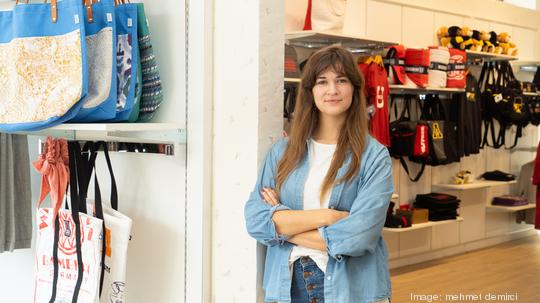
A new partnership between a Greensboro developer and a Raleigh-based clothing company may be giving fresh meaning to the phrase “everything old is new again."
Samet Corporation and Reborn Clothing Company are working together to reduce textile waste by turning wind screens from job sites into tote bags.
Wind screens are the material wrapped around fences at construction sites for security and branding. Tiffany King, Samet’s sustainability director, said wind screens typically get thrown away after construction projects are complete, adding plenty of waste to landfills.
King said Samet had already been strategizing about ways to reduce their overall footprint when the idea for the project came about.
“We produce a lot of waste, lots of dumpsters with materials, we try to divert as much of that as possible through recycling efforts and finding these different partnerships like this as they come up to find ways to get the material reused, repurposed, whatever we can, get it to other folks that could use it rather than just ending up in landfills,” King said.
Neville started Reborn Clothing in 2017 when she was a 19-year-old sophomore at North Carolina State University. Her business started out as a way for individuals to transform their old clothes into updated products such as tote bags, pillows and laptop sleeves. Reborn has since branched out to working with universities and corporations on upcycling, downcyling and corporate gifting solutions.
Instead of manufacturing herself, Neville said she orchestrates the project from start to finish and contracts the production out to supply-chain partners. Reborn Clothing has done similar projects with other corporations, including Raleigh Denim and Hanesbrands (NYSE: HBI).
“I’m really excited to work with more partners in the industry,” Neville said.
King said Samet's director of corporate social responsibility, Ilina Ewen, had already been connected with Neville and the team at Samet was impressed with her work.
Ewen said she started at Samet around a year ago, she went to a project site for the first time and she saw miles of wind screen being thrown into dumpsters. She thought that there had to be a better use for the material, and sent samples to Neville, who came up with the idea of using the textile waste to make tote bags, which are then given to employees and clients as tokens of appreciation.
“It’s a way for us to show client and employee appreciation with something that’s personal” Ewen said.
King added that in addition to keeping construction material out of landfills, the partnership also keeps Samet from having to produce marketing merchandise using new materials.
"We're able to actually reuse a product from our job sites, its a cool story, we hand that to our clients and they can have a piece of their actual project which I think is really cool, and we've saved it from going to a landfill for no good reason," she said.
King said the production of the bags starts after a construction project has been completed. The wind screen material is cleaned while still hanging up, then taken down and rolled into bundles to be taken to Trotter’s Sewing Company in Asheboro, the manufacturer for the project.
Ewen said one of the biggest challenges of the project has been transporting the material to Asheboro, since Samet has job sites all over the state. She said the company currently has 87 active construction sites and projects across North Carolina.
Samet has four office locations in North Carolina — Greensboro, Charlotte, Raleigh and Wilmington — in addition to offices in Charleston, South Carolina, and Savannah, Georgia.